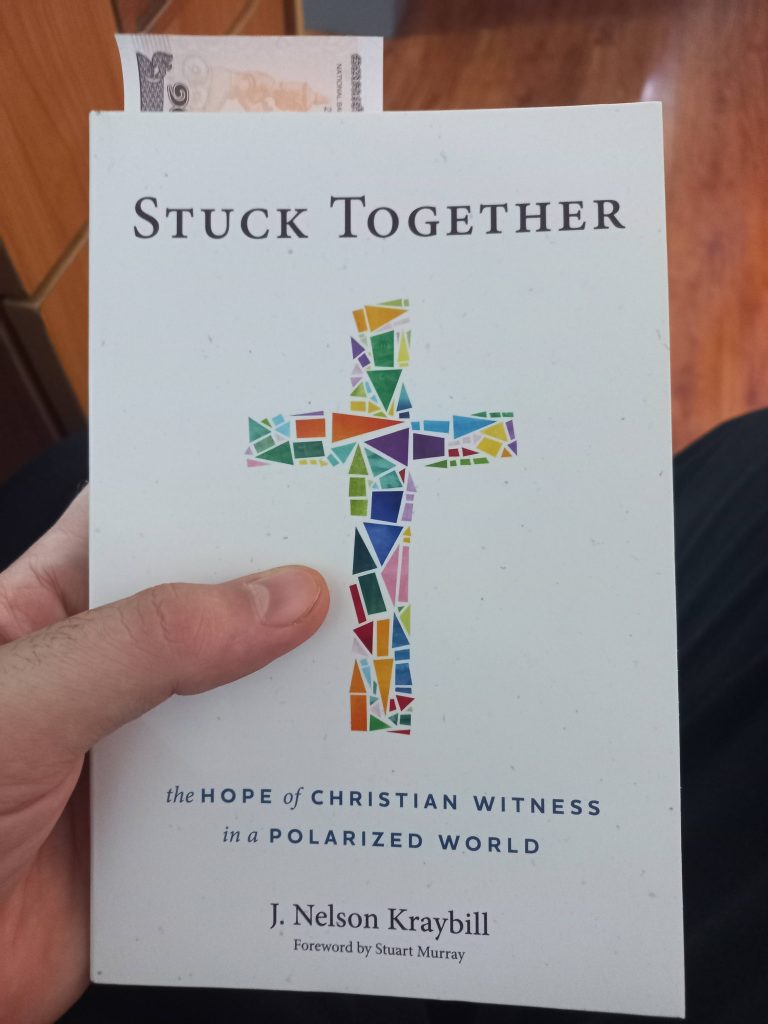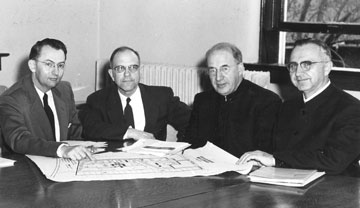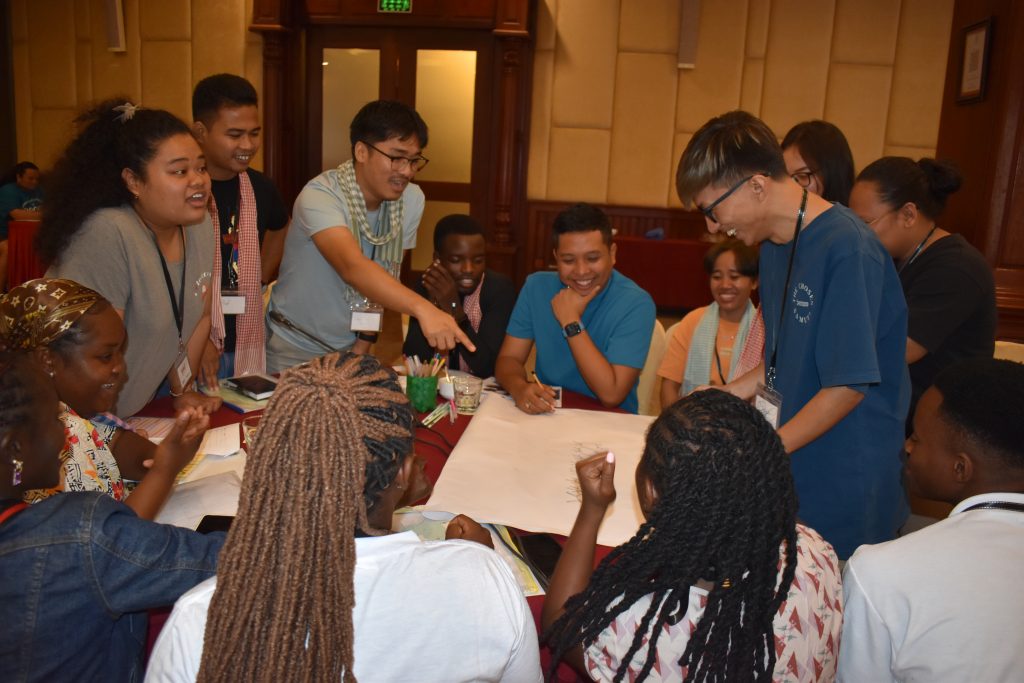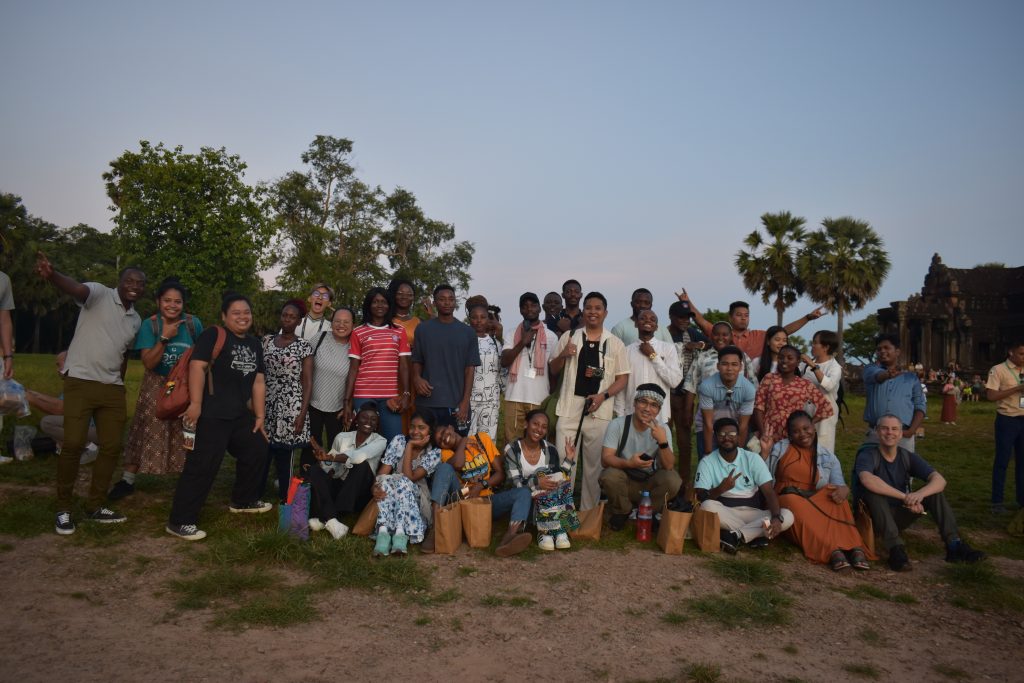I’ve been reading a book by J. Nelson Kraybill titled Stuck Together: the Hope of Christian Witness in a Polarized World. It’s a very inspiring book that speaks to the kind of presence I personally believe Christianity should have in the world. Nelson writes from a lifetime of experience and seamlessly weaves together contemporary real life examples, scripture, and historical references.

That ongoing reading came in a sharp contrast to an article in Anabaptist World this week that the leaders of Mosaic Mennonite Conference – the church conference that Crystal and I belong to – have recommended withdrawing membership from Mennonite Church USA. The reasons why are outlined in the article and in Mosaic’s announcement on the subject, but they’re the reasons that one would expect a church conference to give for leaving a national denomination in 2024. The Mosaic leadership has also proposed that, instead, Mosaic has a partnership with Mennonite Church USA in which the conference could continue to receive some of the benefits of national membership. My first reaction to the news was less than charitable and I accused the proposal of being a Brexit style “break relationship but keep the benefits” arrangement.
“No one did more than Erland Waltner to bring together the two largest Mennonite denominations in North America.”
J. Nelson Kraybill on the formation of Mennonite Church USA
Crystal’s maternal grandfather was a man named Erland Waltner. His life’s work was to restore community among Anabaptists and by every account he did this with gentleness, kindness, and grace. Healing rifts and bringing together diverse people were his legacies to our faith community through his work at Associated Mennonite Biblical Seminary, Mennonite World Conference, and elsewhere.

Mosaic Mennonite Conference was formed in 2020 through the reconciliation of Eastern District Conference and Franconia Mennonite Conference, healing an ideological rift that dated back to 1847. I was not the only one who celebrated on that happy day. I thought the Mosaic was a beautiful symbol – individual broken pieces coming together to form a whole and beautiful image. Not agreeing on everything but agreeing to exist in a community. A vibrant new harmony that acknowledged the differences while celebrating the many things held in common. Abounding in Love, abiding in Grace.
Today it’s hard not to feel naive for having been so optimistic. Anabaptist community splintering apart on the grounds of ideological purity is a sad part of our history…and a tragic part of our present. Sadly, one of the cultural practices that Mennonites are known for among the broader population is shunning. Reading Stuck Together encouraged my long held belief that Christians still have something to offer our polarized world but it’s hard to sustain that belief when we can’t even stay in community with our own brethren. It is so sad.

I don’t want to end these reflections on that note. So, in closing, let me share something about our work here in Cambodia.
Every year we send and receive young Christian adults from around the world through various exchange programs. As I’ve said before, I believe that – regardless of the types of service that the participants perform – that the cultural exchange is in and of itself some of the most fundamental peacebuilding that we do.

What I don’t think I’ve shared is that these young adults come with very different understandings of what it means to be a Christian. There are always ideological disagreements between them ranging on almost every topic you can think of.
- What is ‘real’ worship?
- Are we engaged in spiritual warfare?
- Will God bless us with financial prosperity if our faith is strong enough?
- Does the Church have a responsibility to promote social justice?
- Should women be silent in the church?
- Who can be a member of the Church?
- Will there be a rapture?
- Should parents hit their children?
- Is saving souls more important than advocating for justice or meeting physical needs?
- Can there be such a thing as a Christian Nation?
- Should the rich hold more power in Church since they pay the bills?
- And so on.
It’s not as simple as conservative vs liberal. There is a kaleidoscope of belief among the global church.
John said to Jesus, “Teacher, we saw someone using your name to cast out demons, but we told him to stop because he wasn’t in our group.”
Mark 9:38-41 NLT
“Don’t stop him!” Jesus said. “No one who performs a miracle in my name will soon be able to speak evil of me. Anyone who is not against us is for us. If anyone gives you even a cup of water because you belong to the Messiah, I tell you the truth, that person will surely be rewarded.”
And yet, year after year, we see these young adult navigate these differing beliefs and disagreements to come together in community. It’s not easy or without conflict. But there’s a transformative power to person-to-person interactions – learning to see each other as a people made in the image of God, worthy of love and respect, even if that person has the “wrong” beliefs. This doesn’t mean that they come to to agree with each other…far from it…but that they come to respect, listen, and learn from each other. It’s messy and difficult, but there’s a subtle power to breaking bread together – okay, in Cambodia it’s usually eating rice together.
It’s in those normal moments – not the social media posts, lengthy pontificating, or even quoting scripture – that I’ve seen the seeds of transformation take root. If we refuse to be in community together, to leave spaces for those person-to-person interactions, I don’t know how we can follow Jesus’ command to us, “As I have loved you, so you must love one another. By this everyone will know that you are my disciples, if you love one another.“
Thanks so much, Charles, for your very open, honest and helpful reflections on the current proposal within Mosaic Conference. There are more than a few of us who are not supportive of this direction to “shift” our membership in MCUSA to a partnership. The interesting irony in all of this is that within some of our congregations, and across Mosaic Conference, there’s already as much diversity as between Mosaic and MCUSA… and that will presumably continue! I wish we could live into the fullness of Kraybill’s vision and the very name of our newly-formed conference, as we continue to reflect both the joy and the struggle that you witness and facilitate with your global young adult ministry there in Cambodia! May you and all of us continue to be filled with a larger vision of God’s saving work in the world!
Thank you Pastor Mike. Sometimes it’s easy to feel out of touch living here on the other side of the world when I hear news like this from the conference. I wonder did the church change? How did relationships shift since we’ve been gone? Your words are reassuring to me. We have been praying for the church (both specifically and figuratively) and will continue to do so.
Amen to both your and Mike’s reflections!
Thanks for this reflection and remembering my dad.